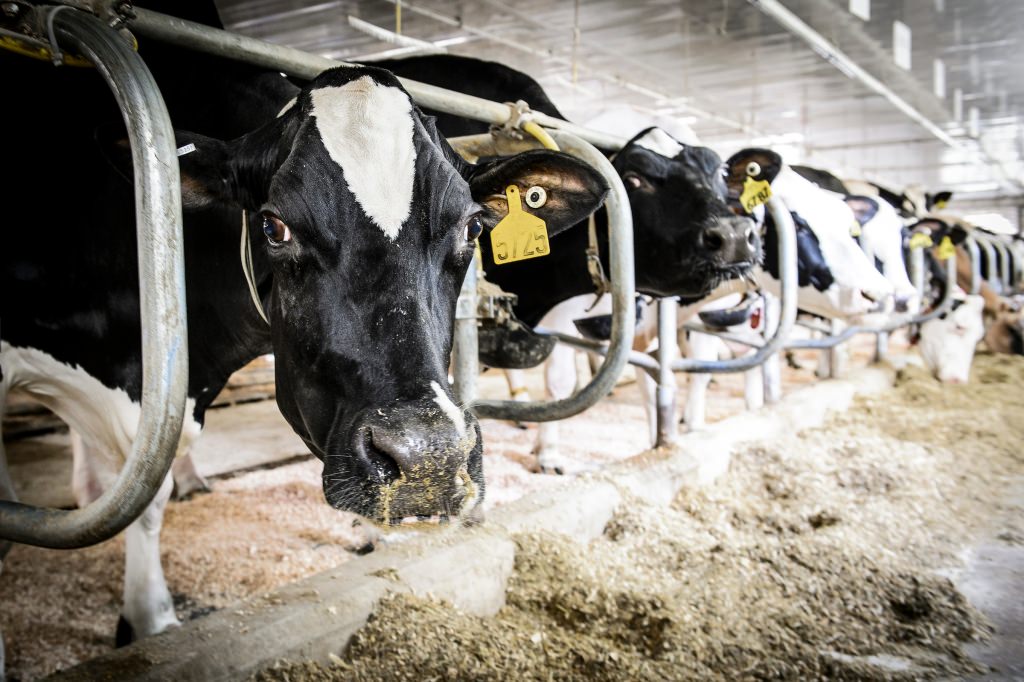Cheese, cows and manure: Systems approach makes tough decisions easier to digest

Holstein dairy cows feed at the UW–Madison Dairy Cattle Center. Milk is not the only thing they produce in prodigious quantities. Photo: Bryce Richter
Wisconsin is known as America’s Dairyland. More than one-third of all the cows in United States live on more than 3,000 farms in Wisconsin.
Those bovine residents contribute to a thriving dairy industry, but milk is not the only thing they produce in prodigious quantities. That many cows inevitably lead to a significant amount of manure.
“It is a horribly complex problem and we all contribute to it and are affected by it,” says Victor Zavala, a University of Wisconsin–Madison chemical and biological engineering professor who is working on a new approach to manure management. “Farms generate the manure, and we are all affected by its environmental impacts. But manure production is driven by strong economic forces originating from urban areas that demand dairy products.”
Phosphorus runoff from manure-laden farm fields causes unpleasant and sometimes dangerous algal blooms in water bodies. Manure also releases potentially harmful bacteria and methane gas.
Technologies do exist to process organic waste while recovering valuable products such as biogas and a compound called struvite used as fertilizer, but these technologies are affordable only for large farms.
Choosing a suitable solution involves much more than technology cost alone. Where to locate manure processing plants, how to transport the waste, and who should pay for the equipment are all challenging questions — often involving competing interests.
“This problem is too complex. You need to find simpler and more direct ways to explain the interactions between social, economic and technology aspects to people making decisions,” says Zavala.
Conflicting stakeholder interests complicate the problem further. Such conflicts can arise because of a lack of data about technology and logistical constraints.
Zavala and his colleagues are developing a framework for decision making to help people narrow their options and reach agreements in complex and potentially controversial decisions such as manure management. By systematically quantifying costs, environmental impacts, and people’s opinions and priorities, these tools can help lead to compromise solutions that maximize collective stakeholder satisfaction.
“You need to find simpler and more direct ways to explain the interactions between social, economic and technology aspects to people making decisions.”
Victor Zavala
Support for the research comes from the U.S. Department of Agriculture, the National Science Foundation, the U.S. Environmental Protection Agency, and Dane County in Wisconsin.
“We are hoping that with this framework, we can have a more informed negotiation process. Instead of just telling stakeholders what they should do, we want to provide better frameworks for people to negotiate on what the manure management infrastructure would do,” says Zavala, who is leading the effort along with Rebecca Larson, an assistant professor of biological and systems engineering at UW–Madison.
Importantly, the researchers will include quantitative measures of stakeholders’ satisfaction in their models to ensure that the opinions of all groups — rural and urban communities, farmers, political leaders, environmental regulators, and scientists alike — are heard and considered.
“We try to come up with fair solutions that please as many stakeholders as possible, with the important observation that you will very rarely be able to please everyone,” says Zavala. “The framework can also be used to inform stakeholders on how their opinions influence (or not) the final decision. That is a powerful piece of information.”
Tags: agriculture, engineering, research

